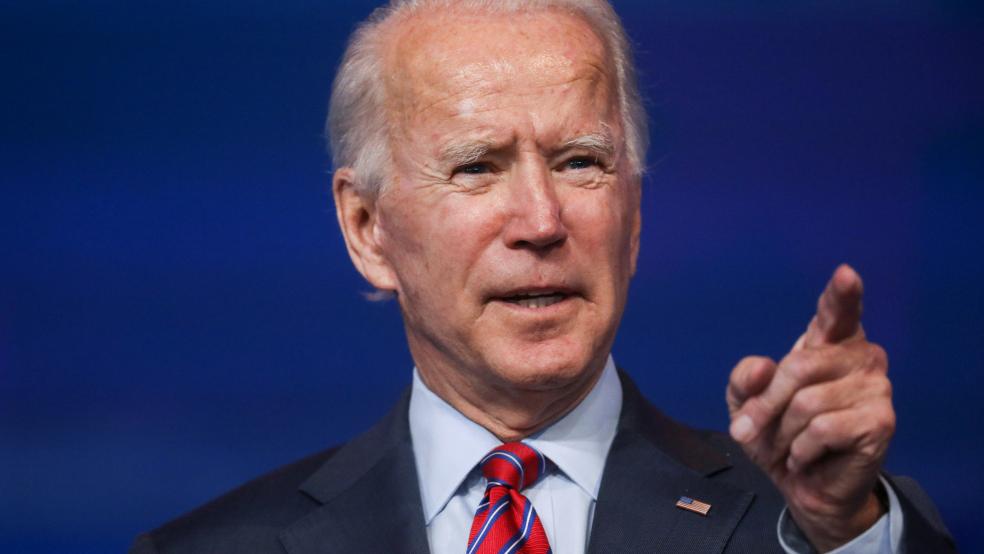President Biden’s flurry of first-week executive orders comes as his $1.9 trillion proposal for the next coronavirus relief package faces intense Republican opposition, including from moderates whose votes might be needed in the Senate if the administration tries to pass the legislation on a bipartisan basis.
Republicans say the Biden plan is too big, too costly and comes too soon on the heels of the package passed in December. "We just passed $900 billion worth of assistance. Why we would have a package that big now? Maybe a couple of months from now," Sen. Susan Collins (R-ME) said. "The needs will be evident, and we will need to do something significant. But I'm not seeing it right now."
GOP senators made clear this week that Biden’s plan would not be able to get the Republican votes that would be needed for passage. “I don’t think it can get 60 [votes]. Because even the people on our side that would be inclined to want to work with the administration on something like that, that price range is going to be out of range for them,” said Senate Minority Whip John Thune (R-SD), according to Politico. “Absent some change and economic conditions, etc., I think that would be a very heavy lift.”
Seeking agreement – or not: Brian Deese, director of Biden’s National Economic Council, is planning to meet with a bipartisan group of 16 senators on Sunday to try to make the case that the economy needs support on the scale of Biden’s proposal, and that the risk of doing too little far outweighs the risk of doing too much.
“We’re at a precarious moment for the virus and the economy,” Deese told reporters at a White House press briefing Friday. "What I can tell you is, if we don’t act now, we will be in a much worse place and we will find ourselves needing to do much more to dig out of a much deeper hole.”
The administration’s push for another large relief package comes as emergency unemployment benefits provided under the $900 billion Covid package passed last month are set to expire on March 14.
Democrats, meanwhile, are also looking at bypassing the threat of a Republican filibuster, with House Speaker Nancy Pelosi reportedly telling donors Thursday night that she wanted to pass Biden’s plan in two weeks via a process known as reconciliation, which would require a simple majority rather than 60 votes in the Senate. Some House Democrats have considered passing a smaller, bipartisan package focused on vaccine funding and direct payments to Americans, but party leaders reportedly have yet to finalize their strategy.
The White House is reportedly pressing Democrats to be patient as Biden works to figure out the contours of a possible compromise deal. “Biden has spent the last several days on the phone with lawmakers in both parties, and his team has started a blitz in recent days not only to walk through the proposal with lawmakers and staff, but also listen to their concerns and potential proposed changes,” CNN reports.
Debt concerns resurface: A number of Republicans have based their objections to Biden’s plan in renewed concerns about the nation’s large deficits and the rapidly rising debt.
The Washington Post’s Catherine Rampell argues in a Friday column that those rediscovered GOP concerns are both hypocritical and misguided: “As soon as a Democrat enters the White House, Republicans pretend to care about deficits again,” she writes. “These foul-weather fiscal hawks neglect to mention, of course, that the GOP’s prized 2017 tax cuts added nearly $2 trillion to deficits — back when the economy was doing okay. Nor did they note that — again, before the coronavirus pandemic — the Republican-controlled Senate passed and President Donald Trump signed spending bills that added another $2 trillion to deficits.”
Rampell notes that, while the country does face long-term structural budget challenges, economists including incoming Treasury Secretary Janet Yellen and Federal Reserve Chair Jerome Powell, among many others, have urged Congress to provide more aid and set aside debt fears for the time being.
Yellen, as we told you earlier this week, told the Senate Finance Committee that higher deficit spending is actually the fiscally responsible thing to do right now. “To avoid doing what we need to do now to address the pandemic and the economic damage that it’s causing would likely leave us in a worse place fiscally and with respect to our debt situation,” Yellen said.
Biden has echoed that argument, saying again Friday that the benefits of his plan will far exceed the costs and that our debt situation would ultimately be less stable if we don’t provide additional economic relief now.
Republican objections to Biden’s plan go beyond the cost to the specific policies. “It’s reckless to borrow another $2 trillion on top of $4 trillion already in the pipeline,” Sen. Chuck Grassley writes in a Friday op-ed for Fox News. “While more pandemic relief is needed, some of the line items are a political pipe dream for progressives.” Grassley again calls the Biden plan a “liberal laundry list” and warns that Biden’s proposed $15 federal minimum wage would “wipe out” small businesses that are already hurting.
The bottom line: This weekend’s meeting between Deese and centrist senators will be just one step in the Biden administration’s efforts to navigate a path toward a bipartisan compromise after its $1.9 trillion opening bid. Congressional Democrats are preparing a more partisan approach as a fallback option, but for now Biden reportedly prefers trying to drum up Republican support and believes he can find a way to secure 10 votes from the Senate GOP. Either way, this process is likely going to take a while.





